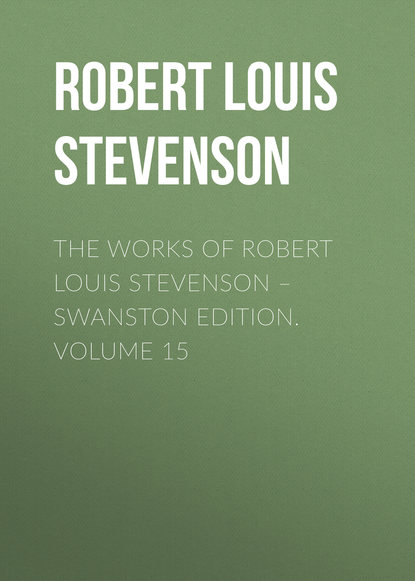По всем вопросам обращайтесь на: info@litportal.ru
(©) 2003-2025.
✖
The Works of Robert Louis Stevenson – Swanston Edition. Volume 15
Настройки чтения
Размер шрифта
Высота строк
Поля
Gaunt. But for the grace of God, there lies John Gaunt! Christopher, you have saved my child; and I, I, that was blinded with self-righteousness, have fallen. Take her, Christopher; but O, walk humbly!
MACAIRE
A MELODRAMATIC FARCE IN THREE ACTS
PERSONS REPRESENTED
Robert Macaire
Bertrand
Dumont, Landlord of the “Auberge des Adrets”
Charles, a Gendarme, Dumont’s supposed Son
Goriot
The Marquis, Charles’s Father
The Brigadier of Gendarmerie
The Curate
The Notary
A Waiter
Ernestine, Goriot’s Daughter
Aline
Maids, Peasants (Male and Female), Gendarmes
The Scene is laid in the Courtyard of the “Auberge des Adrets,” on the frontier of France and Savoy. The time 1820. The Action occupies an interval of from twelve to fourteen hours; from four in the afternoon till about five in the morning
Note. —The time between the acts should be as brief as possible, and the piece played, where it is merely comic, in a vein of patter
ACT I
The Stage represents the courtyard of the “Auberge des Adrets.” It is surrounded by the buildings of the inn, with a gallery on the first story, approached, C., by a straight flight of stairs. L.C., the entrance doorway. A little in front of this, a small grated office, containing business table, brass-bound cabinet, and portable cash-box. In front, R. and L., tables and benches; one, L., partially laid for a considerable party
SCENE I
Aline and Maids; to whom, Fiddlers; afterwards Dumont and Charles. As the curtain rises, the sound of the violins is heard approaching. Aline and the inn servants, who are discovered laying the table, dance up to door L.C., to meet the Fiddlers, who enter likewise dancing to their own music. Air: “Haste to the Wedding.” The Fiddlers exeunt playing into house, R.U.E. Aline and Maids dance back to table, which they proceed to arrange
Aline. Well, give me fiddles: fiddles and a wedding feast. It tickles your heart till your heels make a runaway match of it. I don’t mind extra work, I don’t, so long as there’s fun about it. Hand me up that pile of plates. The quinces there, before the bride. Stick a pink in the Notary’s glass: that’s the girl he’s courting.
Dumont (entering; with Charles). Good girls, good girls! Charles, in ten minutes from now what happy faces will smile around that board!
Charles. Sir, my good fortune is complete; and most of all in this, that my happiness has made my father happy.
Dumont. Your father? Ah, well, upon that point we shall have more to say.
Charles. What more remains that has not been said already? For surely, sir, there are few sons more fortunate in their father: and, since you approve of this marriage, may I not conceive you to be in that sense fortunate in your son?
Dumont. Dear boy, there is always a variety of considerations. But the moment is ill chosen for dispute; to-night, at least, let our felicity be unalloyed. (Looking off L.C.) Our guests arrive: here is our good Curate, and here our cheerful Notary.
Charles. His old infirmity, I fear.
Dumont. But, Charles – dear boy! – at your wedding feast! I should have taken it unneighbourly had he come strictly sober.
SCENE II
To these, by the door L.C., the Curate and the Notary arm in arm; the latter owl-like and titubant
Curate. Peace be on this house!
Notary (singing). “Prove an excuse for the glass.”
Dumont. Welcome, excellent neighbours! The Church and the Law.
Curate. And you, Charles, let me hope your feelings are in solemn congruence with this momentous step.
Notary (digging Charles in the ribs). Married? Lovely bride? Prove an excuse!
Dumont (to Curate). I fear our friend? perhaps? as usual? eh?
Curate. Possibly; I had not yet observed it.
Dumont. Well, well, his heart is good.
Curate. He doubtless meant it kindly.
Notary. Where’s Aline?
Aline. Coming, sir! (Notary makes for her.)
Curate (capturing him). You will infallibly expose yourself to misconstruction. (To Charles.) Where is your commanding officer?
Charles. Why, sir, we have quite an alert. Information has been received from Lyons that the notorious malefactor, Robert Macaire, has broken prison, and the Brigadier is now scouring the country in his pursuit. I myself am instructed to watch the visitors to our house.
Dumont. That will do, Charles: you may go. (Exit Charles.) You have considered the case I laid before you?
Notary. Considered a case?
Dumont. Yes, yes. Charles, you know, Charles. Can he marry? under these untoward and peculiar circumstances, can he marry?
Notary. Now, lemme tell you: marriage is a contract to which there are two constracting parties. That being clear, I am prepared to argue categorically that your son Charles – who, it appears, is not your son Charles – I am prepared to argue that one party to a contract being null and void, the other party to a contract cannot by law oblige or constrain the first party to constract or bind himself to any contract, except the other party be able to see his way clearly to constract himself with him. I donno if I make myself clear?

















